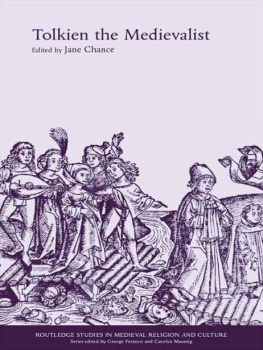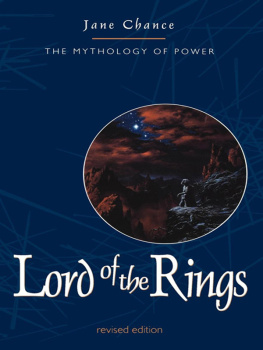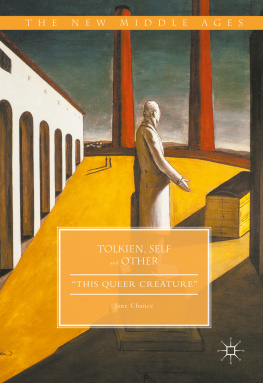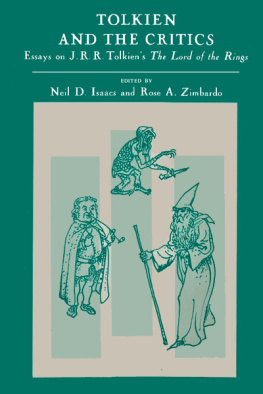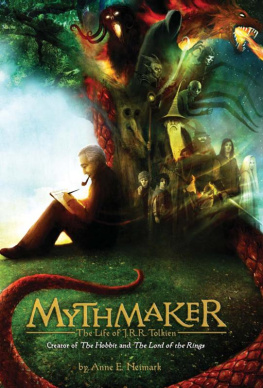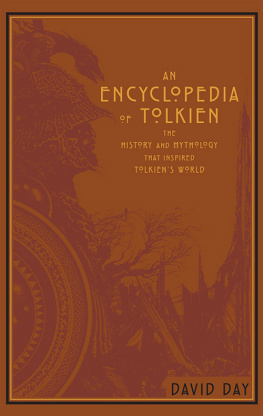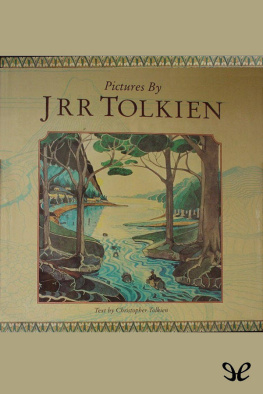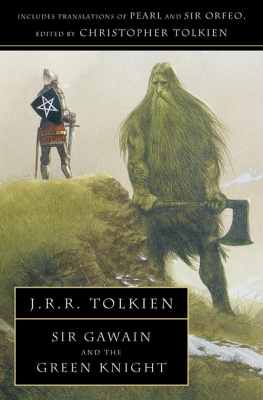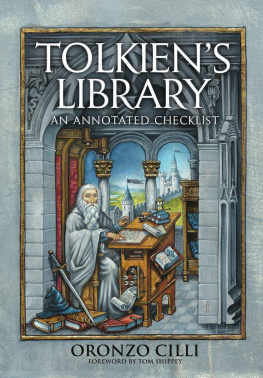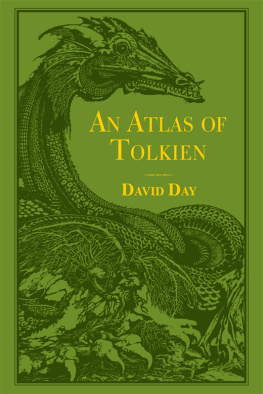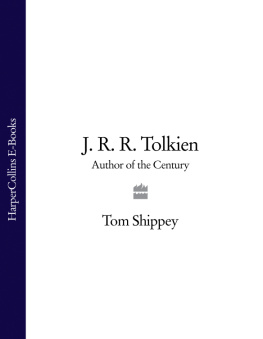Tolkien the Medievalist
Tolkien the Medievalist explores how Tolkien's creative worlds were shaped by his own scholarship on medieval literature. In trying to create a "mythology for England" in the space of his fiction, Tolkien inevitably drew upon extant medieval languages and literatures.
This is the first recent collection to examine anew the question of Tolkien's medievalness. Interdisciplinary in approach, the essays explore Tolkien's position within the context of twentieth-century medieval scholarship and religious movements and his use of various works of medieval literature as a palimpsest for the development of his own ideas.
In the first section, essays focus on how Professor Tolkien invested his professional interests in his writing and how those works and the movements of his day may have affected his fiction. The second and third sections focus on specific episodes, characters, concepts, and images and how they correspond to medieval literary antecedents, in Old Norse, Old and Middle English, medieval Latin, and in medieval Catholicism. In the fourth section, essays explain how mythological retextualization in his fiction assumes a medieval form.
Essential reading for all scholars interested in J. R. R Tolkien, this work will also be of vital interest to those working in the fields of medieval history and literature, literary history, and literature in the early twentieth century.
Jane Chance, Professor of English, teaches medieval literature and J. R. R. Tolkien at Rice University, Houston, Texas. Among her seventeen books are Tolkien's Art: A Mythology for England, The Lord of the Rings: The Mythology of Power, and two guest-edited issues of Studies in Medievalism. She also edits two series, the Library of Medieval Women and the Greenwood Guides to Historic Events in the Medieval World.
Contents
JANE CHANCE
DOUGLAS A. ANDERSON
VERLYN FLIEGER
ANDREW LAZO
MARY FARACI
CHRISTINE CHISM
VERLYN FLIEGER
LESLIE A. DONOVAN
MIRANDA WILCOX
MARGARET A. SINEX
JOHN WILLIAM HOUGHTON
BRADFORD LEE EDEN
JONATHAN EVANS
MICHAEL W. MAHER, S.J.
GERGELY NAGY
RICHARD C. WEST
Contributors
Douglas A. Anderson's first book was The Annotated Hobbit (Houghton Mifflin, 1988; revised edition 2002). He has also overseen the corrected texts of The Hobbit and The Lord of the Rings, published by Houghton Mifflin (US), and HarperCollins (UK), and is co-author (with Wayne G. Hammond) of J. R. R. Tolkien: A Descriptive Bibliography (Oak Knoll Press, 1993).
Jane Chance, Professor of English, Medieval Studies, and the Study of Women and Gender at Rice University, has published seventeen other books on Old and Middle English, medieval mythography, medieval women, and modern medievalism, including revised editions of Tolkien's Art: A Mythology for England (Macmillan, 1979; University Press of Kentucky, 2001) and The Lord of the Rings: The Mythology of Power (Twayne/Macmillan, 1992; University Press of Kentucky, 2001), and guest-editions of two issues of Studies in Medievalism, on Medievalism in the Twentieth-Century (1982; rpt., 1991) and the Inklings (1991).
Christine Chism, Assistant Professor in English at Rutgers University, New Brunswick, New Jersey, is interested in medieval romance, drama, and travel narratives. She has published articles on late medieval alliterative poetry, Chaucer, and the fifteenth-century Robin Hood ballads, and her book, Alliterative Revivals, was published by the University of Pennsylvania Press in 2001.
Leslie A. Donovan teaches interdisciplinary courses on medieval culture and on Tolkien in the University Honors Program at the University of New Mexico. Her background and current research emphasize Old English and Old Norse literature, and she has recently published a book titled Women Saints' Lives in Old English Prose (Boydell & Brewer, 2002).
Bradford Lee Eden is currently head of Bibliographic and Metadata Services at the University of Nevada, Las Vegas. He has a master's degree in library science from Indiana State University (1984) and a Ph.D. in medieval musicology from the University of Kansas (1991). He publishes extensively in librarianship, metadata, medieval music and liturgy, and Anglo-Saxon studies, and has a lifelong interest in dragons and a love of all things Tolkien.
Jonathan Evans is Associate Professor of English and Director of the Medieval Studies Program at the University of Georgia. He teaches courses in Old English language, Beowulf, and medieval literature; he has published articles and essays on Old English, Old Norse, C. S. Lewis, and J. R. R. Tolkien in reference works and scholarly journals, including the Dictionary of Literary Biography, the Journal of Folklore Research, Style, Semiotica, the Journal of English Linguistics, NOWELE, and the Journal of English and Germanic Philology. His essay "The Dragon-lore of Middle-earth" was published in J. R. R. Tolkien and his Literary Resonances (Greenwood Press, 2000).
Mary Faraci is Professor of English at Florida Atlantic University, where she serves as the Director of English Undergraduate Studies. She teaches courses in English linguistics, literature, and composition. Her publications include linguistic approaches to the works of Jane Austen, Saul Bellow, and Dante. An essay on the contributions of the lexicographer Herbert Dean Meritt to Old English studies has been accepted by Language and Style.
Verlyn Flieger is Professor of English at the University of Maryland at College Park, where she teaches courses in Tolkien, Arthurian myth and legend, and medieval epic and myth. She is the author of two books on J. R. R. Tolkien, Splintered Light: Logos and Language in Tolkien's World (Eerdmans Publishing, 1983), soon to be republished by Kent State Press, and A Question of Time: J. R. R. Tolkien's Road to Farie (Kent State Press, 1977). She is co-editor with Carl Hostetter of Tolkien's Legendarium: Essays on The History of Middle-earth (Greenwood Press, 2000).
John William Houghton, Chaplain and Chair of the Department of Religious Studies at the Episcopal High School of Baton Rouge, studies Anglo-Saxon appropriation of late antique ideas and has published articles on Alcuin, Bede, and Dunstan as well as on Tolkien.
Andrew Lazo is a Ph.D. student in English at Rice University, Houston, Texas. His research interests focus on C. S. Lewis, regarding especially myth, medievalism, and theory. He has contributed to Seven and done archival research at the Marion E. Wade Center.
Michael W. Maher, S.J., is an Assistant Professor of History at St. Louis University. His area of research in Early Modern History emphasizes popular religion and the role of the Jesuits in promoting approved religious practice. He received his doctorate in history from the University of Minnesota, and advanced theological degrees from the Jesuit School of Theology at Berkeley.
Gergely Nagy is a Ph.D. student at the University of Szeged, Hungary, writing his doctoral dissertation on the possible integration of Tolkien's texts into a poststructuralist theoretical framework. His professional interests include medieval English literature, specifically Arthurian romance and Malory. Nagy has also published essays on Sir Thomas Malory and Geoffrey Chaucer.
Next page
